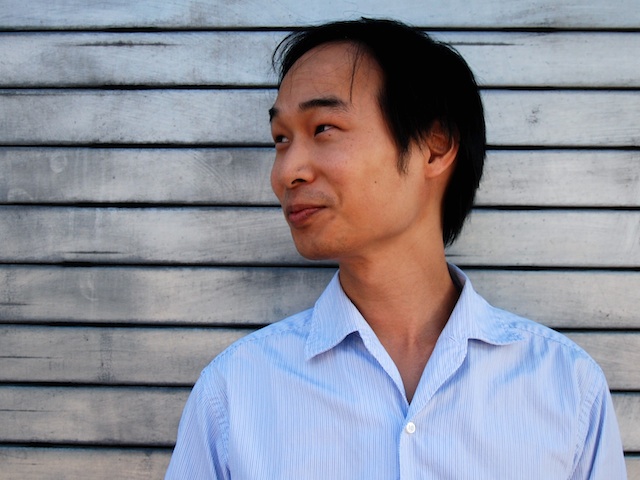We prayed for resurrections, / but the dead remain as memories that / seemed to shrink in the mind, / like an airplane appearing smaller / the further it gets from the ground.

May 29, 2018
LANSING SINULOG REHEARSAL, 2010
January in Michigan means Viva Pit Senor, aluminum trays
heavy with pancit, dinuguan, pinakbet, caldereta, lumpia,
leche flan, bibingka and five Hot-N-Ready pizzas for
the husbands and children. My mother is wearing paint
on her face, a candle on her head. You see, Sinulog is not
just a religious holiday, but a festival, a performance.
If no one will remember our history, then we will reenact
a version every year, even if a January blizzard is coming
through, Michigan-style, in which the trees die standing,
and the roads are as treacherous as the early modern
seas. Still, we sashay into the community center, wrapped
in polyester fibers and fake leather gloves. We slide off
our sodden boots, go barefooted. In this performance
of our history, someone’s white husband plays Magellan.
This husband used to work for GM before the auto
industry crisis. Now he is unemployed and enjoying his
role as a powerful, yet bumbling navigator, captain-general.
The actor’s wife is playing a native Filipina. She has no lines,
only dances, but in reality, she talks fast and uncensored
like a late-night radio DJ. Because I’m a teenager, she teaches
me the Bisaya word for masturbation, and throughout
the rehearsal, I can’t stop saying it: lulo. My dad tells me
to stop, for goodness sake, but why should I, when everyone
is laughing, and the word is perfect. Lulo, I say, lulo.
All the Filipino wives are playing native dancers, and their
husbands are playing conquistadors, because what were
the conquistadors if not small-town men with beer breath
wearing plastic armor, holding a figurine of a brown baby
Jesus while a native woman throws them the keys to their
Buick sedan asking them to grab the paper plates. We’ll need
paper plates, since this rehearsal involves eating as much food
as we’ll eat at the real party so we’ll know if our costumes
still fit. Most of these husbands met their wives on the internet,
but in the 1500s, it was a little different. You got on a boat
first to find spices or gold or coconuts or unconditional
love. Someone’s muscular Fil-Am son plays Lapu-Lapu,
who in real life Filipino history, is known for slaying Magellan
with an iron sword before Magellan could make his way
around the world. Magellan was probably killed by a group
of native folks—not just one Filipino guy—but we like this
version of the story because it is a historical representation
of the conflictedness we feel on the inside. And who doesn’t
love a good one-on-one fight? If Mani Pacquiao lived in Lansing,
he could’ve been our Lapu-Lapu, and our Magellan (Ron)
wouldn’t have stood a chance, the poor guy. An obstetrician
from Baguio plays a smart Enrique of Malacca, Magellan’s slave
and translator (who may have betrayed Magellan’s crew after his
death, but we’re not mentioning that here), and an accountant
from Manila plays Raja Humabon, the king who converted
to Catholicism as an act of diplomacy. I am Princess Amihan,
the king’s wife. I am also the director of this wacky, factually
dubious play, and I tell Magellan that he should stop doing
that thing with his shoulders, and I tell Lapu-Lapu to learn his
godforsaken lines, and I yell at the dancers to stop chattering,
because this is serious, because the performance is tomorrow,
and we’ve got to do this right. And my mother keeps telling me
that I should move my hips when I dance, because I am as stiff
as a Methodist church in the suburbs, and I weep because I
will never dance as beautifully as she does, and I will never
be who she wants me to be: a nurse. No way can I make it
through nursing school, when I am the director of this play.
And tomorrow, everyone will scrape the ice off their windows,
and carry the food in the trunks of their American cars. They
will say their lines. I will say my lines, and I won’t say: lulo, though I
will be tempted to say it, before the lights go down, and the drums
start beating hard like a heart from the boombox speakers,
and before the community center fills with brown faces, laughing
and cheering, because this play is for all of us, it is our reckoning.
MY MOTHER TELLS ME ABOUT LOLO
It was a Friday, the temperature tepid,
a perfect day for a trim, my hair down
to my waist. My father—with his
penchant for tinkering, his amateurish
hair salon posture—snipped eight inches
off my head easily like tags on newly
bought merchandise. Such cavalier-ness,
such lack of precision. I saw my new
hairdo and cried hard for my lost locks,
my diminished strength. I, a little-girl
Samson. He, my Delilah. I wept for
hours, until he patted me on the shoulders,
said—It’s okay, Inday, it will grow! It will grow!
When my hair came back, he never
again approached me with a pair of
scissors. He reserved his hair-related
experiments for his sons, who also
found themselves weeping in front
of mirrors after he left them as patchy
and lop-sided as the stray dogs who
chased the Jeeps in Carbon. Again, he
replied—Ah, mga amaw! Don’t cry! It will
grow back! And years later, when I lived
in Germany, when my husband was
deployed, I brought my babies home
to the Philippines. The little one got sick,
had a fever, lost weight so fast no one
knew what to do. My father spit on her
neck, told her—Inday, you will grow—
and soon, she was healthy again, as if this
was some incantation, some heathen
magic he knew. He died shortly after
we left, still young and handsome as César
Ramirez. They gelled his hair, sprinkled
a little cologne behind his ears. They
torched his body, he shrank into ashes.
Years later, when they amputated my
mother’s gangrened legs, he wasn’t
around to say: Don’t worry. They will grow
back. And when Death took my mother,
my brothers, he wasn’t alive to tell the ones
left behind: They will grow, they will all grow,
they will all grow back. And he was right to be
dead and silent. No one who has died has
ever returned, has ever grown back from
the loam. We prayed for resurrections,
but the dead remain as memories that
seemed to shrink in the mind,
like an airplane appearing smaller
the further it gets from the ground.



